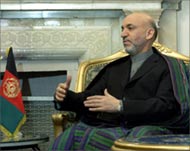Afghan drug production reported rising
Opium poppy cultivation in Afghanistan has soared to near-record levels in 2004, posing a serious threat to the country’s stability, the International Narcotics Control Board says.

Production of opium poppies rose from 3200 tonnes in 2003 to 4200 tonnes last year, approaching levels last seen when the Taliban was in power, International Narcotics Control Board (INCB) president Hamid Ghodse said on the release of the agency’s annual report on Wednesday.
“This total comes close to the record of 4600 tonnes registered in 1999 under the Taliban regime,” he added, warning that the new increase put Afghanistan “on the road to becoming a major drug-trafficking state”.
Afghanistan is already the world’s top producer of poppy, used to make opium.
The INCB is an independent group set up to implement UN drug conventions.
Severe threat
Last year’s dramatic increase threatens Afghanistan‘s efforts to rebuild after decades of conflict, following the US-led invasion that toppled the Taliban in late 2001, the Asian representative for the UN Office on Drugs and Crime, Akira Fujino, said in Bangkok.
|
“The widespread drug problem is a severe threat to the young democracy, and the stability and the economic recovery of the country as a whole” Akira Fujino, |
“The widespread drug problem is a severe threat to the young democracy, and the stability and the economic recovery of the country as a whole,” he said.
“Not surprisingly, the unlimited and uncontrolled availability of both narcotic drugs and psychotropic substances in Afghanistan has contributed to a significant increase of drug abuse in the country itself.”
“The situation calls for a very swift response by the international community,” Fujino said.
President Hamid Karzai vowed to fight drugs after taking over as the country’s elected president in December.
Increased funding
The United States has promised $780 million for the fight against drugs in 2005.
Britain, which was part of the coalition that toppled the Taliban, last month pledged to double its funding to fight drugs in Afghanistan to $100 million.
In its report, the INCB estimated that one-third of the opium poppies harvested in Afghanistan last year passed through countries in the region, in particular Kazakhstan and Tajikistan.
 |
|
President Karzai has pledged to |
“The large quantities of Afghan heroin transiting through Central Asia towards the Russian Federation and other countries in Europe is adding to the illicit drug problems in this sub-region,” the report stated.
These problems included an increase in intravenous heroin use, which in turn contributed to the spread of HIV, the virus that causes Aids, in the region, notably in India and Nepal, it said.
The INCB said it noted with alarm that poppy cultivation returned last year to Pakistan, where the authorities also confiscated acetic anhydride, a chemical used in the manufacture of heroin.
The good news was that the cultivation of opium poppies “reduced significantly” in 2004 in Myanmar and Laos, and Thailand ceased to be an important supplier of opium and heroin, according to the report.
The INCB said it was also satisfied that the fight against the production of precursors – chemical compounds used in the manufacture of heroin and cocaine – had dropped.